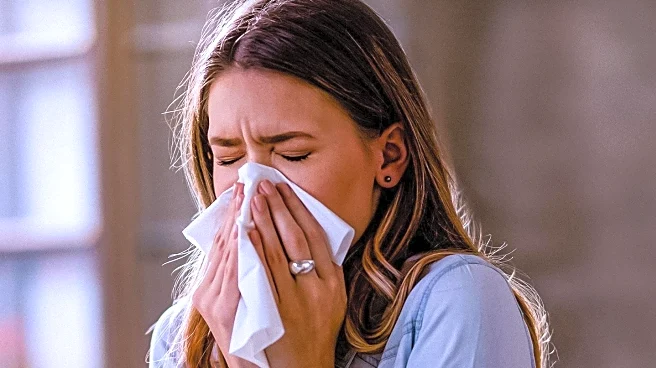What's Happening?
The UK Health Security Agency has reported a decline in vaccination rates among pregnant women and children, coinciding with the death of a baby from whooping cough. The infant's mother was not vaccinated against the disease, which is highly infectious and affects the lungs and airways. This marks the first such death in the UK this year. Vaccination rates for pregnant women peaked at 76% in 2016 but fell to 59% by March last year. Although rates have recovered to 73%, they remain below the peak. Additionally, vaccination rates for primary schoolchildren are at their lowest in 15 years, with nearly one in five children not fully protected from diseases such as whooping cough, polio, tetanus, and diphtheria. The NHS plans to start vaccinating all babies against chickenpox by combining it with the MMR vaccine from next year.
Why It's Important?
The decline in vaccination rates poses a significant public health risk, particularly for vulnerable groups such as infants and young children. The UK is currently below the World Health Organization's 95% threshold for herd immunity for all childhood vaccines, increasing the risk of outbreaks of preventable diseases. The recent fatality underscores the importance of maintaining high vaccination rates to protect against severe illnesses. The planned introduction of the chickenpox vaccine for babies aims to enhance protection and prevent future outbreaks. Ensuring pregnant women receive vaccinations is crucial for passing immunity to their newborns, highlighting the need for increased awareness and accessibility of vaccines.
What's Next?
The NHS will begin vaccinating all babies against chickenpox by combining it with the MMR vaccine starting next year. Efforts to increase vaccination rates among pregnant women and children are expected to continue, with healthcare providers encouraged to offer vaccines at optimal times. The UK Health Security Agency is likely to monitor vaccination rates closely and may implement additional measures to boost uptake. Public health campaigns may be launched to educate parents and expectant mothers about the importance of vaccinations in preventing severe illnesses.
Beyond the Headlines
The decline in vaccination rates may have broader implications for public health policy and healthcare systems. Ethical considerations arise regarding the balance between individual choice and community health protection. The situation may prompt discussions on mandatory vaccination policies and the role of misinformation in vaccine hesitancy. Long-term shifts in public health strategies could be triggered, focusing on improving vaccine accessibility and combating misinformation.









